- Home
- Bobby Akart
Patriot's Farewell Page 2
Patriot's Farewell Read online
Page 2
Just as the Constitution and the Founding Fathers intended, these local grassroots efforts expanded to the state level. Soon, the regional FEMA officials inserted by the federal government were removed and the nation was on the road to recovery.
Life in the political fishbowl changed after that unusual election following the collapse. The nation came together and party differences were set aside as Sarge guided the nation back onto solid footing. After the scheduled midterm elections of 2018, the honeymoon was over and the struggle for political power began once again.
Sarge learned what a real political campaign was like. Abbie had forewarned him. As the vice presidential candidate prior to the collapse, she’d been through the trenches.
A typical campaign day, Abbie said, was like Groundhog Day. “You listen to yourself say the same things over and over until your brain starts to rebel, encouraging you to make random, crazy alterations to your stump speech. While this might amuse you in some way, it would make you appear crazy to the media, and that is unacceptable. Our political candidates are expected to be perfect, not a fallible human being like the rest of the electorate.”
There was an upside to campaigning, which he discovered during his quest for re-election. Day after day, for a dozen weeks during the final sprint of the endurance race until Election Day, Sarge bathed in a sea of love. Whether he was addressing the deafening cheers of crowds filling a park in Orlando, Florida, or inside an airplane hangar in Oshkosh, Wisconsin, it had all been the same—hundreds of thousands of ordinary Americans who celebrated the fact that Sarge, one of them, had ascended to the presidency and succeeded.
The love hadn’t quite been universal, of course. There were those who criticized his approach to the recovery. Many lamented Sarge using the occasion of the collapse to rewrite several laws, setting the country’s social justice agenda back several decades. Sarge was quick to remind them that he didn’t invent the phrase never let a good crisis go to waste.
Sarge shook off the chill and the memories of the past eight years as he ran along the still waters of the reflecting pool toward the Lincoln Memorial. Yet he couldn’t help but recall the quote that was often misattributed to President Lincoln: “America will never be destroyed from the outside. If we falter and lose our freedoms, it will be because we destroyed ourselves.”
President Lincoln never delivered this quote precisely as it has been used over time, but the point he made at an educational institution in 1838 was prophetic. America wasn’t brought to its knees by a larger, more powerful nation. It was hastened toward an inevitable collapse by the cyber attack that collapsed the grid. But make no mistake, America was a nation in decline socially, morally, and economically. It was just a matter of time because, as Sarge firmly believed, all empires collapse eventually.
As Sarge jogged past the large statue of Lincoln, he rehashed the intentions of his mentor, John Morgan, as it related to the reset. Morgan, like Sarge, saw the fabric of American society descending into the abyss. The country was destined for societal and economic collapse. Morgan thought a triggering event, the cyber attack, would hasten the collapse, but the nation could then get a fresh start within the principles established by the Founding Fathers.
At the time, his actions seemed reprehensible, but in hindsight, after eight years of Sarge’s presidency and leadership, the nation had come back on stronger footing. Sarge was leaving the nation to the new administration in the best fiscal condition in its history. For the most part, the wounds of a divided populace had healed. The recovery effort had brought folks back together. The partisan bickering and sniping prior to the collapse had given way to a spirit of cooperation and a focus on the important things in life.
“Mr. President,” interrupted Captain David Morrell, the head of Sarge’s security detail. Morrell, a former Marine and part of the protection unit assigned to Prescott Peninsula, had become close friends with Sarge and a constant companion. Despite their friendship, Morrell always referred to Sarge in a manner befitting the president. “Sir, we need to alter your route this morning. Protestors are gathering near the front gate, and with the light traffic on the Mall this morning, you’ll be seen.”
“Okay, Dave,” said Sarge, who glanced at his watch. “This is gonna be a big week and we certainly don’t need the aggravation to get it started, do we?”
“No, sir. Let’s double back and we’ll reenter the White House grounds the way we came. I’ve already alerted the team.”
The shouts began to get louder as Sarge could see the sign-holding protestors gathering along the wrought-iron fence surrounding the White House lawn. The chants and shouts reminded Sarge that not everything was unicorns and rainbows across the fruited plain. It was still, in part, a protestor nation.
Chapter 2
7:00 a.m.
The Family Residence
The White House
Washington, DC
The president’s residence is the center structure of the White House Complex, the most famous building in the world. The White House consists of three major parts including the East Wing, the West Wing, and the presidential mansion, or Executive Residence. The second and third floors of the mansion were the private quarters of the First Family and for their guests.
Sarge and Julia’s family had expanded with the birth of Win on that first inauguration day. Win was now seven and declared himself to be the big-brother-in-chief of his two siblings. Rose was born five years ago following Morgan’s funeral, and Francis, who at age three had a mind of his own, was the First Family’s youngest. This youngster, who insisted upon being called Frank, was Steven Sargent reincarnated. Basically, he was a walking, talking middle finger without Steven’s vocabulary.
The family dynamic was not unlike any other family with three children. Raising three kids was not simply a matter of creating and keeping alive two kids plus one. Four is a tidy number, ask any restaurant with tables that seat four people. A family of four is simple. One parent gets a child, and so does the other one. But who gets the third?
Sarge and Julia made it a point to find time with each child although Sarge admitted having difficulty relating to Rose. She was not a daddy’s girl. For Sarge, raising Win was easy. He was his mini-me. He could look into little Frank’s eyes and see his brother and the future that was in store for the toddler. But with Rose, he stared into his wife’s eyes, and Julia, at age three, stared back.
Growing up in the limelight was far from easy. The White House was an office, a museum, a place for gatherings and social events, but many tended to forget it was a home to the First Family.
When President and Mrs. John F. Kennedy moved into the White House, they had young Caroline, who was four, and John-John was a baby. They were the youngest children to live in the White House until President Sargent moved in with Julia and Win. Both Rose and Frank were the first babies to be born in the Executive Residence.
Sarge did the best he could to help raise their children. He kept a strict routine when he was in residence. Following his run, he’d join the family for breakfast and assisted Julia in getting the kids’ day started. At night, unless his duties kept him away late, he’d make every effort to tuck the kids in bed, which often included a family bedtime story. Sarge knew his days in public life would come to an end and he didn’t intend to lose contact with his children during their formative years.
“Good morning, Rose,” said Sarge as he leaned down to plant a kiss on his daughter’s cheek. He was still sweating from his run and she quickly let him know about it.
“Daddy!” she squealed. “So yucky! So rude!”
“But,” Sarge attempted to protest, “I love you and I missed you during my run.” His attempts to tease her fell on deaf ears. She began to swat him with a cloth napkin.
“Yucky!” she shouted again as she tried to pull away from Sarge’s smooch.
“Dear,” said Julia, coming to the rescue of her distraught five-year-old, “how about a quick shower and then you can join us
for breakfast? We’ve got a busy week ahead of us.”
Sarge poured himself a glass of orange juice and took a long drink. Unlike prior presidents, the Sargents insisted on serving themselves breakfast. Julia, under the careful tutelage of Susan Quinn, learned to cook. Not that cooking was a difficult task necessarily, but the menu required to satisfy three young appetites and keep their interest was far different from what adults enjoy. Over time, Julia loosened her grip on the meal preparation and allowed the White House kitchen staff to prepare lunches and dinners, but breakfast was still their family time alone.
“Aren’t they always?” said Sarge with an eye roll. “Tell me, director of all things social here at the White House, what’s the week look like?”
Julia wiped a mess of oatmeal off little Frank’s mush and replied, “We don’t have that many weeks left, and I know there’s a lot going on with you, of course. Anyway, we have the Governor’s Ball tonight. The turkey pardon ceremony on Wednesday. Thanksgiving, we’re hosting the Boston Brahmin and their families. Not to mention the vote and any schmoozing you’d like me to assist you with. You know I can be quite charming with the senators.”
Sarge smiled and attempted to kiss his wife, who also grimaced from his sweatiness. Like daughter, like mother, he thought to himself. They would only occupy the White House for another eight weeks, but there were significant social and legislative matters to attend to in a short period of time.
The vote, as Julia called it, related to the one loose end of Sarge’s presidency. It was a failure on his part, and by the standards of many pundits. After eight years, the Union was still divided.
Prior to his election as president, Sarge and the Loyal Nine orchestrated a Constitutional Convention in St. Louis to address the issues of rebuilding America, certain changes in the Constitution to make the nation more economically viable and socially conscious, and the matter of the previous president who had overstayed his welcome.
Following the collapse, the president had marshalled federal relief and recovery assets to the states bordering the Pacific Ocean—Hawaii, California, Oregon, and Washington. He’d bought their loyalty and they quickly moved to secede from the United States.
One of Sarge’s goals at the Constitutional Convention had been to bring these four states back into the fold, but his attempts fell short. Throughout his presidency, he worked diligently to persuade the state governments to consider the history of the nation first, to set aside their differences, and return to the Union. They refused without their demands being met.
The conditions insisted upon by the four states were both monetary and social in nature. They were at odds with the social values of the majority of the country, and the economic advantages they sought would be unfair to the other states. Moreover, as a condition of reunification, they wanted their specific demands enacted into federal law.
Sarge didn’t negotiate with terrorists and these demands felt similar. He imposed a number of methods ranging from sanctions to psychological operations on the citizens of each state to achieve reunification. The methods didn’t work and now his hand was being forced.
Congress was prepared to vote on a bill that would be a total capitulation to the conditions requested by the four states. In Sarge’s opinion, the Pacific Statehood Act of 2024 was a terrible proposal and would likely result in a political civil war.
“I’ll get cleaned up and join you guys,” Sarge said, snapping his mind away from the daunting task ahead.
Sarge finished his shower and considered his attire for the day. He didn’t always wear a suit during working hours unless he was meeting with foreign dignitaries. Tonight, he’d put on a tux for the Governor’s Ball. He glanced out the window and saw a few snow flurries. Winter is coming early this year.
Early on in his presidency, Sarge became the brunt of media criticism for his casual dress. One former press secretary wrote, “When you have a dress code in the Supreme Court and a dress code on the floors of the House and Senate, one would think it is appropriate to have an expectation there will be a dress code that respects the office of the president.”
Sarge disagreed, to an extent. “When in the people’s house,” Sarge opined, somewhat mocking the former press secretary, “one should be dressed like the people. However, when one engages other heads of state, one should dress appropriately.”
He’d learned not to care what people thought of him. He was his own man. Sarge pulled on a pair of khakis, an LL Bean plaid shirt, and his Sperry Topsiders. Sarge looked very much like the populist president who was elected twice by landslide margins despite the disapproval of some.
Chapter 3
8:00 a.m.
The West Wing
The White House
Washington, DC
Sarge entered the West Wing from the West Colonnade. Most days, he made this walk alone, gathering his thoughts before he made his way to the heart of the American government.
He passed the windows of the former press corps offices to his right. Now they were used by White House staffers after Sarge ordered the media kicked out of the building. During those initial months in the White House, his presidency was beleaguered by leaks, which were quickly pounced upon by the former president and his loyalists. Some of the leaks were by design, but most were nosy reporters working overtime to eavesdrop on conversations or the comings-and-goings of White House visitors. Soon, reporters’ suppositions became fact. The story would grow legs and the White House communications team had to work overtime to dispel rumors and deny conjecture. Sarge recalled asking the question of his team, how do you disprove a lie?
When the announcement was made to remove them from the West Wing, naturally the press screamed and threw a fit. In the end, they accepted their fate, and the move was made to the Old Executive Office Building, where there was more room to work. The additional space also allowed for more participants in the daily briefings above the original forty-nine seats in the press briefing room.
For Sarge, it was a welcome relief from the spotlight, which he never sought. The West Wing was no longer crawling with prying reporters. The leaks stopped, except for their own carefully orchestrated releases, and his message was strategically presented to the public. Moreover, for the most part, he was always surrounded by friendly faces. He learned early on, the media was not his friend despite the incredible hurdles he’d overcome in restoring America to its former greatness. Neither were holdovers from the prior administration—career White House staffers who knew the operations of the facility, but who remained loyal to the previous president.
As Sarge approached the West Wing, a member of his security team opened the door and he was immediately surrounded by the normal buzz of activity.
“Good morning, Mr. President,” said one staffer nonchalantly as she hustled down the corridor toward the Roosevelt Room.
Sarge returned the greeting to the young woman’s back, who was gone in a flash. Sarge took in his surroundings. There seemed to be an added level of tension in the air. A sigh here and a withdrawn look there indicated the White House staff was exhausted. The West Wing crew could only be in a frenzy over one thing, and it wasn’t the upcoming Thanksgiving festivities. It was the vote.
It wasn’t surprising to Sarge, as there was a renewed sense of urgency within the White House following the election of a new president three weeks ago. Naturally, Sarge, on behalf of the Boston Brahmin, whom he still led, got their candidate elected. The president-elect, Stanford Rawlins, was a Southern democrat governor from South Carolina who had helped bring the coalition of southeastern states into the fold during the Constitutional Convention of 2017. He understood his role and came with the highest recommendations from new allies Sarge had forged over the years. More importantly, he met with the approval of the executive committee of the Boston Brahmin.
Despite his best efforts, he was unable to convince Abbie, his logical successor, to run for the highest office. As vice president, she was hugely popular around the country
and had been an integral part of the recovery effort. Although Sarge made a good case for her running, she chose to seek a life with her new husband, Drew Jackson, and their soon-to-be-born baby.
The frantic activity in the White House that Monday morning was a natural result of the change in the political climate in America. Anytime leadership changes, there’s sure to be more than enough chaos to go around in the final days. President-elect Rawlins was bought and paid for with Boston Brahmin influence, both cash and in-kind. There was still a transition process, and appearances had to be maintained.
Although the Boston Brahmin were pleased with their new president, it was the change in the makeup of Congress that had Sarge’s benefactors concerned, or at least some of them. The hot-button issue in the recently held election was the reunification of the fifty states. After several years of successes, some states were falling back into the old ways that had brought America to the brink of collapse. These states were sending a whole new slate of legislators to Washington who would look favorably upon the Pacific Statehood Act.
Sarge effectively postponed a vote on the act until after the election three weeks ago in order to avoid his like-minded members of Congress from having to vote against a bill that was rapidly gaining steam among the electorate. With the vote coming up during Thanksgiving week, he hoped it wouldn’t garner the normal press attention.
Sarge’s goal was simple. He thought something of this magnitude should be voted on by all of the states at another Constitutional Convention. It was too big an issue to leave to the political bickering and backroom deals made in Congress. He felt like he could control this Congress and the vote. The next Congress would be another matter.

 Geostorm The Collapse: A Post Apocalyptic EMP Survival Thriller (The Geostorm Series Book 3)
Geostorm The Collapse: A Post Apocalyptic EMP Survival Thriller (The Geostorm Series Book 3) Doomsday Apocalypse
Doomsday Apocalypse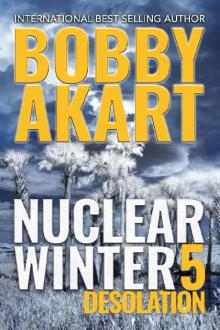 Nuclear Winter Desolation: Post Apocalyptic Survival Thriller (Nuclear Winter Series Book 5)
Nuclear Winter Desolation: Post Apocalyptic Survival Thriller (Nuclear Winter Series Book 5)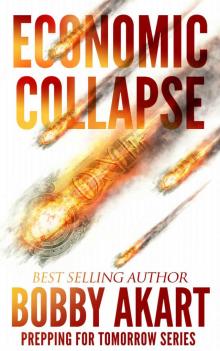 Economic Collapse (Prepping for Tomorrow Book 2)
Economic Collapse (Prepping for Tomorrow Book 2) Nuclear Winter Armageddon
Nuclear Winter Armageddon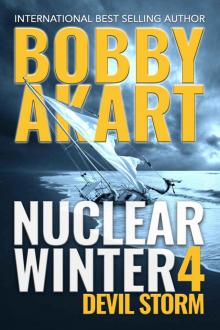 Nuclear Winter Devil Storm
Nuclear Winter Devil Storm Virus Hunters 3: A Medical Thriller
Virus Hunters 3: A Medical Thriller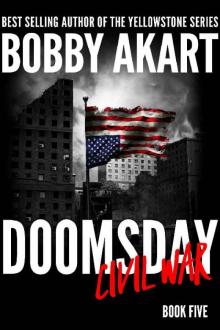 Doomsday Civil War: A Post-Apocalyptic Survival Thriller (The Doomsday Series Book 5)
Doomsday Civil War: A Post-Apocalyptic Survival Thriller (The Doomsday Series Book 5) Asteroid Destruction
Asteroid Destruction Geostorm the Shift
Geostorm the Shift Asteroid Discovery
Asteroid Discovery Virus Hunters 2: A Medical Thriller
Virus Hunters 2: A Medical Thriller Geostorm The Shift: A Post-Apocalyptic EMP Survival Thriller (The Geostorm Series Book 1)
Geostorm The Shift: A Post-Apocalyptic EMP Survival Thriller (The Geostorm Series Book 1) Asteroid Diversion
Asteroid Diversion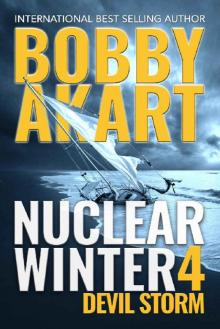 Nuclear Winter Devil Storm: Post Apocalyptic Survival Thriller (Nuclear Winter Series Book 4)
Nuclear Winter Devil Storm: Post Apocalyptic Survival Thriller (Nuclear Winter Series Book 4) Geostorm The Pulse: A Post Apocalyptic EMP Survival Thriller (The Geostorm Series Book 2)
Geostorm The Pulse: A Post Apocalyptic EMP Survival Thriller (The Geostorm Series Book 2) Yellowstone: Survival: A Post-Apocalyptic Survival Thriller (The Yellowstone Series Book 4)
Yellowstone: Survival: A Post-Apocalyptic Survival Thriller (The Yellowstone Series Book 4) Nuclear Winter First Strike: Post-Apocalyptic Survival Thriller
Nuclear Winter First Strike: Post-Apocalyptic Survival Thriller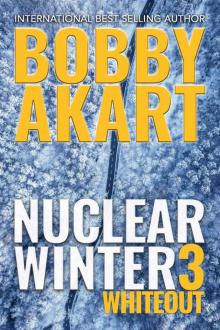 Nuclear Winter Whiteout
Nuclear Winter Whiteout Doomsday Anarchy
Doomsday Anarchy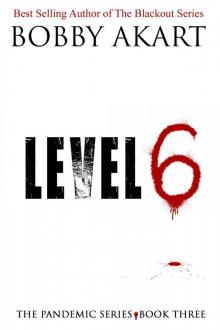 Pandemic: Level 6: A Post Apocalyptic Medical Thriller Fiction Series (The Pandemic Series Book 3)
Pandemic: Level 6: A Post Apocalyptic Medical Thriller Fiction Series (The Pandemic Series Book 3) Martial Law
Martial Law Odessa Reborn: A Terrorism Thriller (Gunner Fox Book 4)
Odessa Reborn: A Terrorism Thriller (Gunner Fox Book 4) New Madrid Earthquake
New Madrid Earthquake Beyond Borders: Post Apocalyptic EMP Survival Fiction (The Lone Star Series Book 2)
Beyond Borders: Post Apocalyptic EMP Survival Fiction (The Lone Star Series Book 2)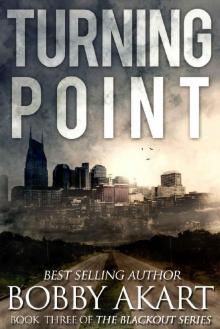 The Blackout Series (Book 3): Turning Point
The Blackout Series (Book 3): Turning Point Patriot's Farewell: A Political Thriller Fiction Series (Boston Brahmin Political Thrillers Book 7)
Patriot's Farewell: A Political Thriller Fiction Series (Boston Brahmin Political Thrillers Book 7) Lines in the Sand_Post Apocalyptic EMP Survival Fiction
Lines in the Sand_Post Apocalyptic EMP Survival Fiction The Mechanics: A Post-Apocalyptic Fiction Series
The Mechanics: A Post-Apocalyptic Fiction Series The Loyal Nine
The Loyal Nine Axis of Evil
Axis of Evil Axis of Evil: Post Apocalyptic EMP Survival Fiction (The Lone Star Series Book 1)
Axis of Evil: Post Apocalyptic EMP Survival Fiction (The Lone Star Series Book 1) Lines in the Sand: Post Apocalyptic EMP Survival Fiction (The Lone Star Series Book 3)
Lines in the Sand: Post Apocalyptic EMP Survival Fiction (The Lone Star Series Book 3) Odessa Strikes
Odessa Strikes The Blackout Series (Book 4): Shiloh Ranch
The Blackout Series (Book 4): Shiloh Ranch Hornet's Nest: A Post Apocalyptic EMP Survival Fiction Series (The Blackout Series Book 5)
Hornet's Nest: A Post Apocalyptic EMP Survival Fiction Series (The Blackout Series Book 5) Yellowstone: Fallout: A Post-Apocalyptic Survival Thriller (The Yellowstone Series Book 3)
Yellowstone: Fallout: A Post-Apocalyptic Survival Thriller (The Yellowstone Series Book 3)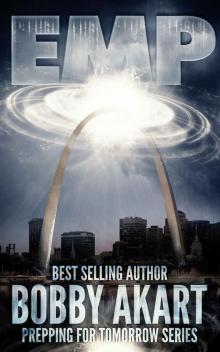 Electromagnetic Pulse
Electromagnetic Pulse Texas Strong: Post Apocalyptic EMP Survival Fiction (The Lone Star Series Book 4)
Texas Strong: Post Apocalyptic EMP Survival Fiction (The Lone Star Series Book 4) Fifth Column_Post Apocalyptic EMP Survival Fiction
Fifth Column_Post Apocalyptic EMP Survival Fiction Patriot's Farewell
Patriot's Farewell Texas Strong_Post Apocalyptic EMP Survival Fiction
Texas Strong_Post Apocalyptic EMP Survival Fiction Pandemic: The Innocents: A Post-Apocalyptic Medical Thriller Fiction Series (The Pandemic Series Book 2)
Pandemic: The Innocents: A Post-Apocalyptic Medical Thriller Fiction Series (The Pandemic Series Book 2) Shiloh Ranch: A Post Apocalyptic EMP Survival Fiction Series (The Blackout Series Book 4)
Shiloh Ranch: A Post Apocalyptic EMP Survival Fiction Series (The Blackout Series Book 4) Cyber Attack
Cyber Attack Beyond Borders
Beyond Borders Choose Freedom: A Post-Apocalyptic Fiction Series (The Boston Brahmin Book 6)
Choose Freedom: A Post-Apocalyptic Fiction Series (The Boston Brahmin Book 6) False Flag
False Flag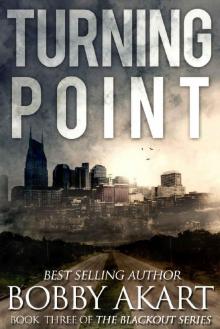 Turning Point: A Post Apocalyptic EMP Survival Fiction Series (The Blackout Series Book 3)
Turning Point: A Post Apocalyptic EMP Survival Fiction Series (The Blackout Series Book 3) Nuclear Winter First Strike
Nuclear Winter First Strike Pandemic: Beginnings: A Post-Apocalyptic Medical Thriller Fiction Series (The Pandemic Series Book 1)
Pandemic: Beginnings: A Post-Apocalyptic Medical Thriller Fiction Series (The Pandemic Series Book 1) Devil's Homecoming: A Post Apocalyptic EMP Survival Fiction Series (The Blackout Series Book 6)
Devil's Homecoming: A Post Apocalyptic EMP Survival Fiction Series (The Blackout Series Book 6) The Blackout Series (Book 6): Devil's Homecoming
The Blackout Series (Book 6): Devil's Homecoming Yellowstone: Inferno: A Post-Apocalyptic Survival Thriller (The Yellowstone Series Book 2)
Yellowstone: Inferno: A Post-Apocalyptic Survival Thriller (The Yellowstone Series Book 2) Fifth Column: Post Apocalyptic EMP Survival Fiction (The Lone Star Series Book 5)
Fifth Column: Post Apocalyptic EMP Survival Fiction (The Lone Star Series Book 5) Yellowstone: Hellfire: A Post-Apocalyptic Survival Thriller (The Yellowstone Series Book 1)
Yellowstone: Hellfire: A Post-Apocalyptic Survival Thriller (The Yellowstone Series Book 1) The Blackout Series (Book 2): Zero Hour
The Blackout Series (Book 2): Zero Hour Suicide Six: Post Apocalyptic EMP Survival Fiction (The Lone Star Series Book 6)
Suicide Six: Post Apocalyptic EMP Survival Fiction (The Lone Star Series Book 6) Suicide Six_Post Apocalyptic EMP Survival Fiction
Suicide Six_Post Apocalyptic EMP Survival Fiction Zero Hour: A Post-Apocalyptic EMP Survival Fiction Series (The Blackout Series Book 2)
Zero Hour: A Post-Apocalyptic EMP Survival Fiction Series (The Blackout Series Book 2) Beyond Borders_Post Apocalyptic EMP Survival Fiction
Beyond Borders_Post Apocalyptic EMP Survival Fiction Pandemic: Quietus: A Post-Apocalyptic Dystopian Fiction Series (The Pandemic Series Book 4)
Pandemic: Quietus: A Post-Apocalyptic Dystopian Fiction Series (The Pandemic Series Book 4) 36 Hours: A Post-Apocalyptic EMP Survival Fiction Series
36 Hours: A Post-Apocalyptic EMP Survival Fiction Series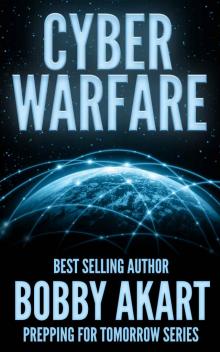 Cyber Warfare
Cyber Warfare